
V Rising | The Strange
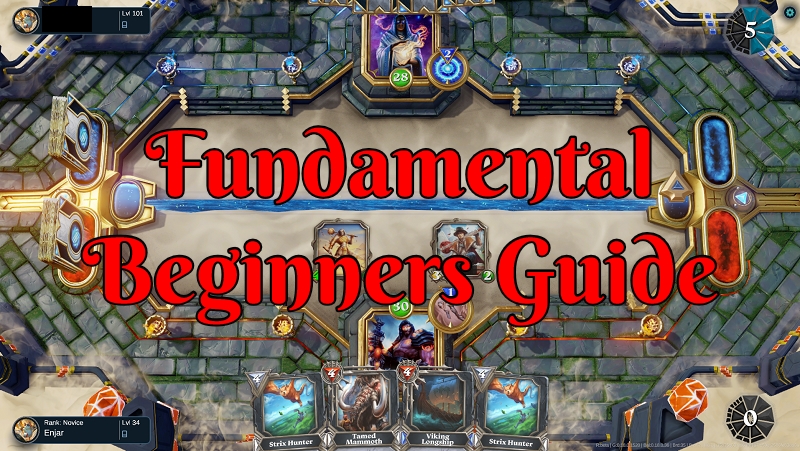
In this guide, I’m going be taking you through the motions of getting started to playing matches and a lot of the basics that are involved in doing so.
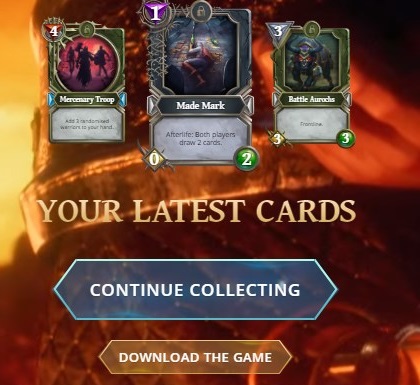
For the moment this game is only playable on the PC. While they have plans in the future for mobile at the time of writing this that was not an option.
You first need a browser with an extension called Meta Mask which is an ETH wallet. You don’t need ETH in the wallet but you do need the wallet to be able to sign in. You can get Meta Mask at this site for Chrome or Firefox. You can also get if you prefer from those browser app/extension stores which I’ll leave you for getting the links for.
Once you have it installed make sure to back up in multiple places your password, passphrase, and keys. That way if something happens you are able to restore and regain access to that wallet.
After that, you can use a beta invite such as mine. All beta invites are referral links
From there you will be brought to a web page that you can click on the download button. Make sure you are signed into Meta Mask as the website will want to confirm the wallet so it can be linked.
Then along in the process, you will prompt you to make an account with a user name that requires an email address for logging into the individual client.
After that, you just need to wait for the PC download to finish and install, patch and get into the game.
If you have any further difficulty beyond this it’s best to hit up there Gods Unchained FAQ section. As things might change over time. This is also where I got the extension link if you prefer to get the link from them.
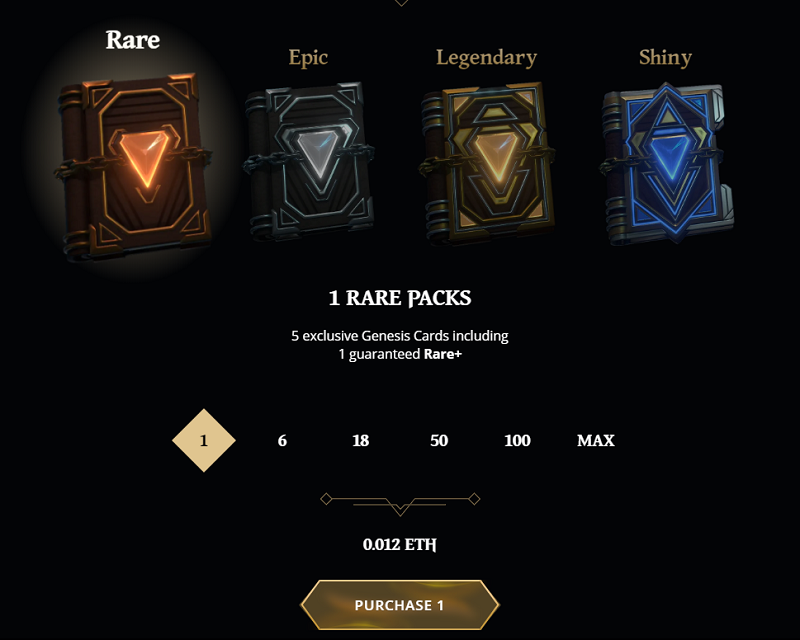
After the first step, you should already have a Meta Mask account and you will need some ETH to buy card packs if that is something you wish to do. You do get free decks to play and can earn cards in-game as well. For those looking to spend you need to do so from the store section of their website. This cannot be done at this time from the PC game client it will just send you to the website.
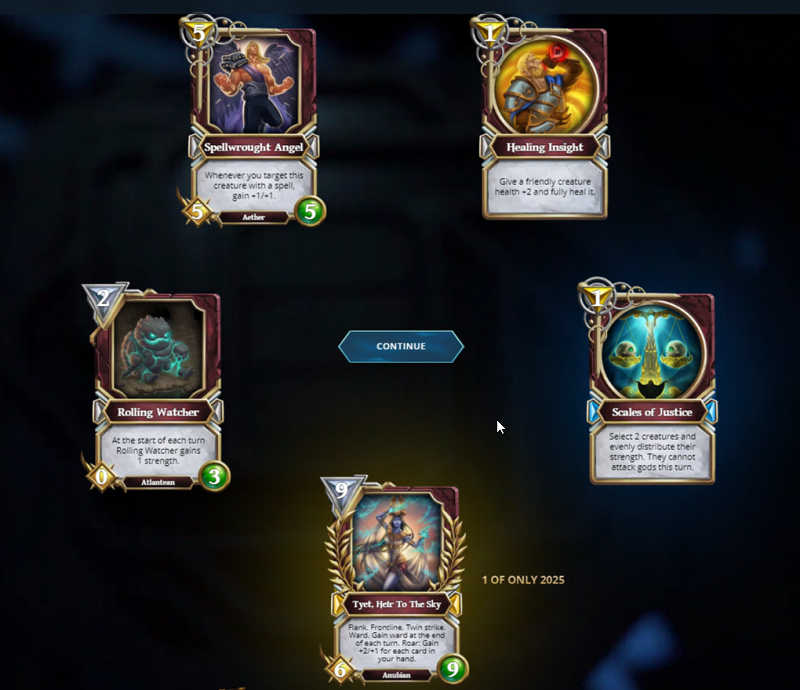
Keep in mind card packs themselves are not tradeable as you can see what is already inside of the pack.
If you want a tradable commodity that contains packs check to see if they have any special chests for sale. These chests will cost perineum over just buying packs. It’s cheaper to buy the packs then chests as people are expected to sell the chests at a later date once that print runs run out and it has the potential to increase in value.
Keep in mind the core packs are not being sold as you earn them from leveling up and from other events. So you can only buy other types such as Genesis card packs if they are still being sold or whatever other packs that replace them once they go out of print.
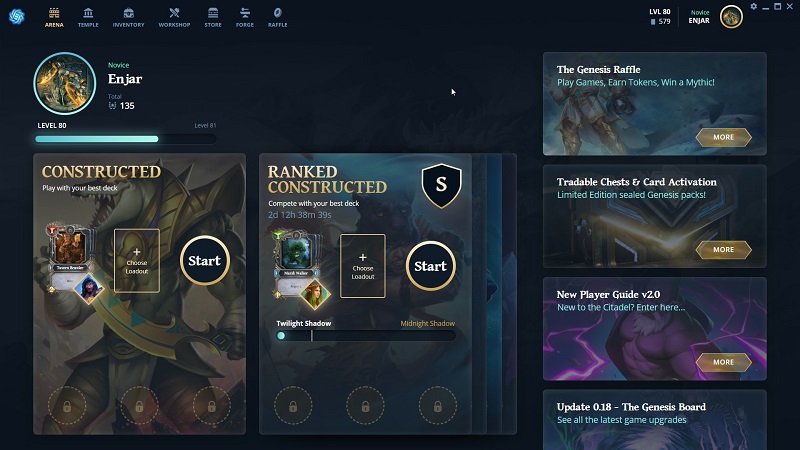
The Temple is where you go to open the free core packs you win from leveling up and competing in special events.
The workshop is your deck builder page. There you can see you already have 6 premade decks that are free to play. One for each of the gods.
Under your in-game name, you can see things like total win count. Along with the current level you are.
Below that is where it gets fun. All the different game mods Gods Unchained has to offer. From the options, you can do things like playing vs the AI or hopefully Ranked Constructed and any other special events that pop up from time to time.
There are some other tabs and information to check out on the home screen. Some of it will change over time as events and other things come and go.
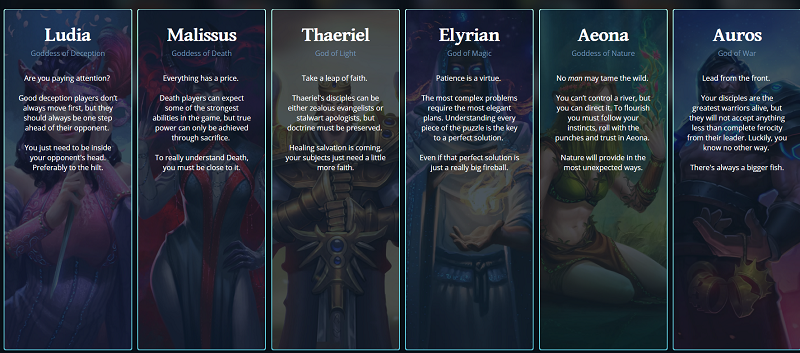
The game starts you off with free starter decks to use and play around with. This gives you the perfect opportunity to see what this game has to offer for free. Later on, if you really enjoy the game you can start buying packs or build a better deck with core cards you have been award from leveling up and events.
Unless you have a lot of experience in trade card games and can quickly identify which god’s starting deck suits the style and flavor you enjoy the most. I would recommend playing each one at least ten to twenty times. This also helps you familiarize yourself with what you will be facing against as well.

If you cannot stand a certain starter deck’s playstyle after ten matches it’s more than ok to move onto the next one. If you are uncertain or are even enjoying it play out the full twenty matches. Just getting time in with all the decks can go a long way to making you a better player.
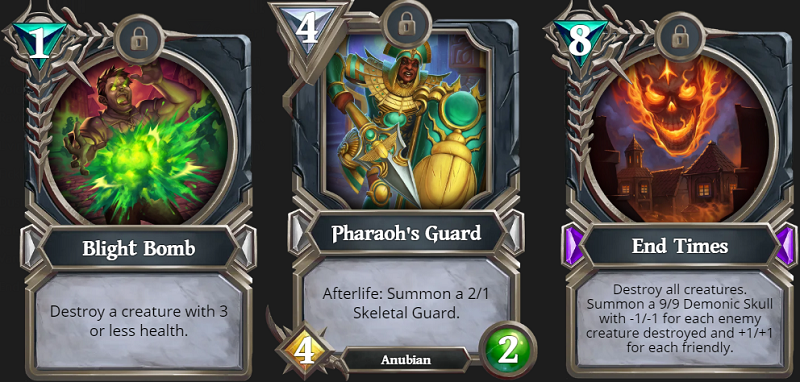
It also has a number of cards with the Afterlife effect. This is an event that triggers after the card die. Making it even more painful to take out one of your cards.
With a card named End Times, you better bet it’s a monster of a spell. Destroying creatures and summing a powerful 9/9. Anyone would be foolish to allow a match to last long enough for you to get that insanity down on the field. That won’t be a mistake they make twice!
Death is not afraid of its self and even welcomes that cold grip into its realm. As it reaches beyond the grave and across the line. Sending your opponent into terror if they are not paying attention as you nomnomnom on their face.
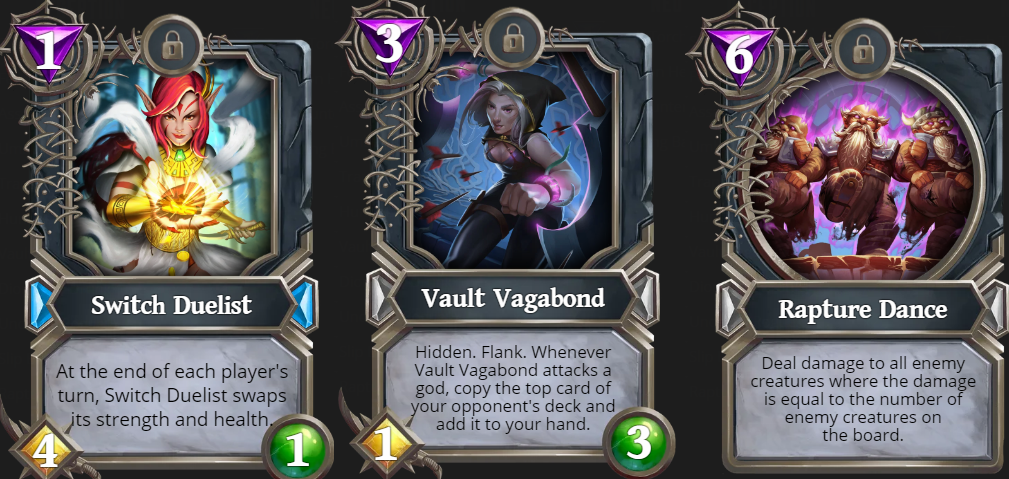
Deception is often found hiding in the shadows plotting out the next thievery, murder or some other form of trick.
For only one mana cost you get quite an early game annoying card to deal with called Switch Duelist. When it’s your turn you can deal four damage to a defenseless frontline or go right for the god's health. When it’s not your turn it has four health. Under the right conditions, it can have quite an effect.
You also get a number of cards that are placed down hidden. Which makes them not attackable and safe until it’s time to strike.
On top of that if you are dealing with a heavy army on the board you get a nice little board clear that most won’t have the health to live thought dealing more damage the more of them there are.
Not a bad starter deck for those that want to stay out of the light till it’s time to take out a target.
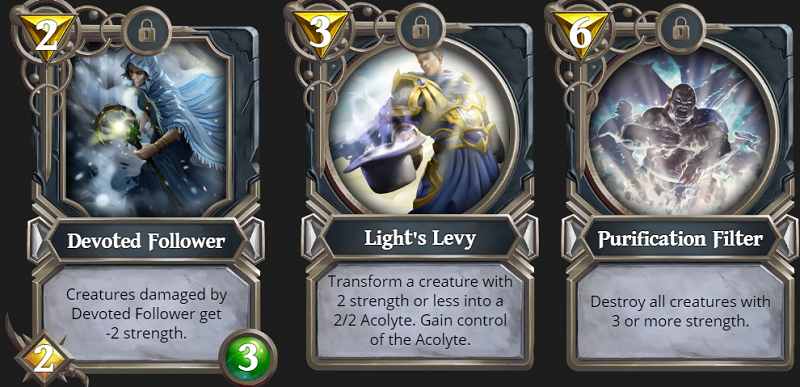
In the end, you got on a bit of a purification destroying all creatures with three or more strength taking down even the hardest-hitting armies that have shown up to your doorstep.
This starter deck is packed full of frontline creatures and those ready to do battle to protect.
Often seen as casting from a distance with minimal effects on the ground as it casts devastating spells that wipe out high health or massive quaintly of creatures marching in for the death blow.
Till you get the right cards you can take a lot of damage to your god. However, once you get something like Tome Golem down who has some solid damage and you get a massive card draw as well. Bringing you one closer step to pulling the card you need for victory.
This deck is for those who just love casting spells. They rather do the heavy lifting themselves with the power of the mind; instead of, sending grunts out onto the battlefield.
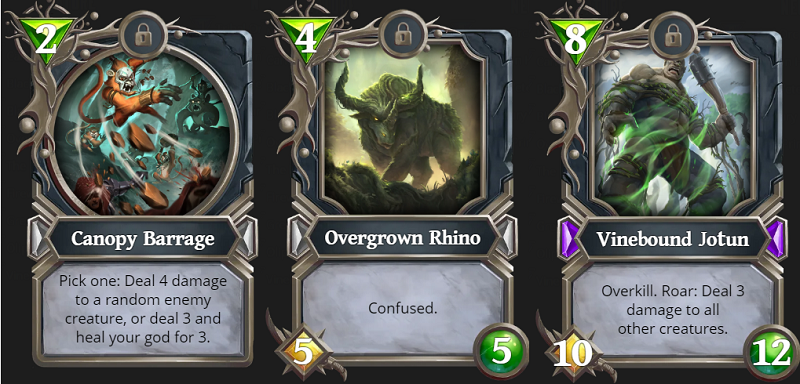
With spells like Canopy Barraged you have a bit of an option in how you wish to apply it. Deal random damage as is the case with some of nature’s spell or deal a little less and get a heal out of the deal. Like a warm embrace of nature as long as you don’t touch a thorn.
One of the cooler things about this god is the overkill ability that many of its creatures have or are given from spells. Any leftover damage after attacking a creature gets applied to the opponent’s gods. Allowing it to still reach deep behind large frontlines and land blows still.
Late game you have that towering juggernaut of a beat called Jotun that damages all creatures on the field when it lands and is quite the beat to take down. If anything was left standing it is surly damaged and won’t escape for much longer.
This starter deck has some great ways to empower the player to maintain domination of the battlefield while still striking at the heart of the opponent’s health. Making it quite the threat to deal with if the opponent they are facing is not managing their health or creatures very well.
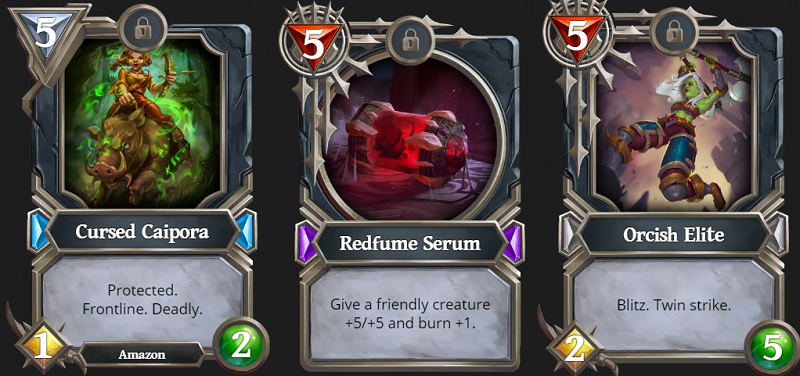
You have a single target takedown with cards like Cursed Caipora that has deadly and frontline. Which gets your opponent to attack it if they want to do any damage to your side and sacrifice whatever hits it in most cases.
There are also a number of abilities that allow you to get out some quick damage. You also stuff like blitz that allows a card to attack the turn it is played. Further along with creatures that have twin strike that can attack twice in one turn. Finally, flank to get around frontline creatures and take out any threats that the opponent is trying to protect.
There is also an end game finisher called Redfumed Serum that adds +5/+5 at the cost of +1 burn to a creature. Making whatever you use it on quite powerful and a force to be reckoned with.
If war is what you want in a starter deck he will bring it to the party with a furry of attacks.
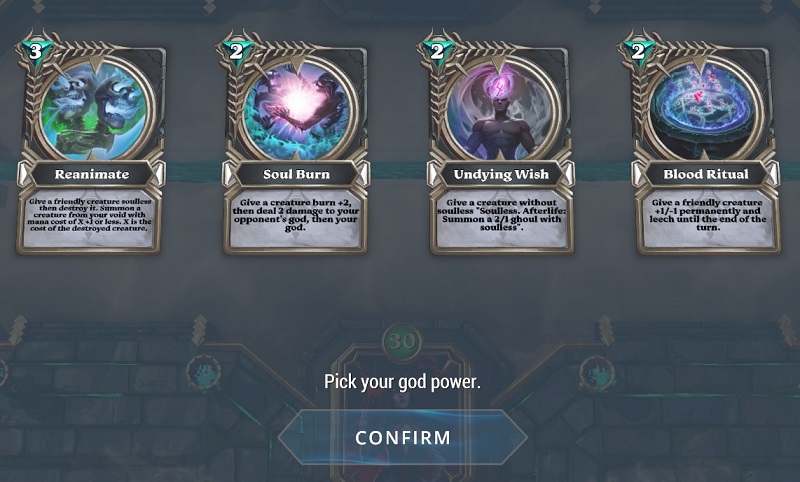
Each god in Gods Unchained has four different powers to select one from in each match. Some of them are going to be really great for the starting deck. While others will not as they are intended to have synergy with cards not in the starting deck for that god.
While you can only have one god power in each match you can use that same one each round if you have the mana to spend. So it can be important to find the one that works for the cards you have and the playstyle you enjoy.
When you are playing your twenty matches you should be taking notes on how often you use a particular god power if at all. Some of them have a low cost making them useful almost every turn you have a spare mana point. Others might have a higher cost and are never used. Meanwhile, something could be cheap but lacks the desired effect you liked.
If you never use it lose it! While you could be told what one is the “best” stuff gets the nerfed from time to time. It’s best to try things out and lose a few matches if needed. You want to better understand how something is used and works. So when you encounter other players having it you know what to expect.
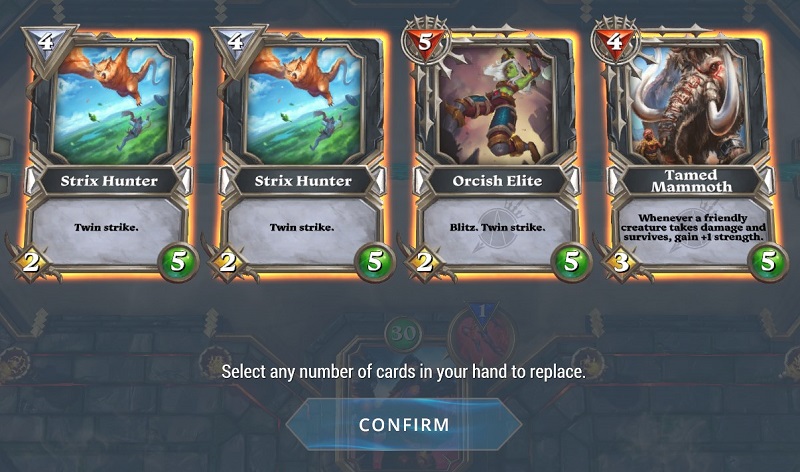
After you have selected your god power you get a choice to keep or discard a set of cards that become your opening hand. In some games like Magic The Gathering Arena or Hearthstone this process is referred to as “mulligan.”
With the deck size only being 30 cards there a good chance if you see something you wanted for mid to late game that you will be able to draw it later on. So, while it’s up to you if holding a key card for later is important or not. This could leave you without cards to play in your first couple of rounds putting you behind.
The biggest thing here you should notice is if you are shown 3 or 4 cards. As this indicates if you are going first or second in the match. Players who go first get a small mana bag where they can have 1 extra mana when they want to use that it and are shown three cards to mulligan. Players who go second get the big mana bag with a couple of uses on it and get to see four cards.
For the beginner, it tends to be best if you are aggressive in only keeping cards that are useful in the first couple of turns. Later on, as you become an Intermediate skilled player you will deploy far more advanced tactics. That tends to be based around game knowledge for the god you are going up against and other information you have learned along the way.
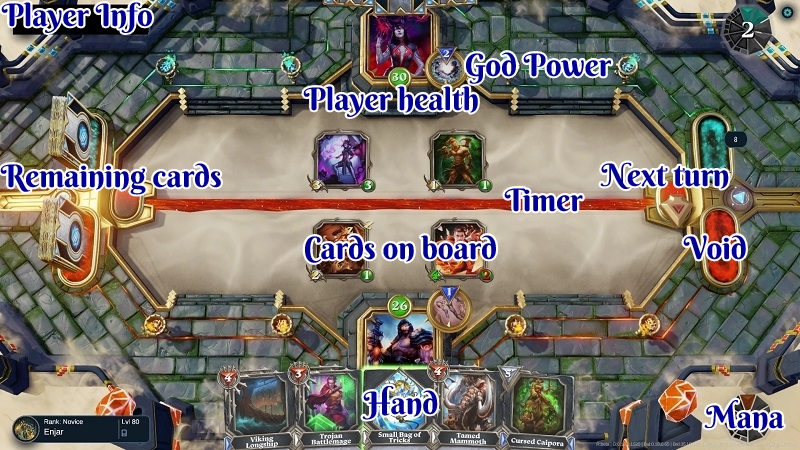
While it might look like a lot of information at first glance. After a couple of matches, you will feel right at home. I just would not take off your shoes as you might get some sand between the toes! You will find parts of the board are important to look at right away and others are more important later into the match.
In the top left is your opponent’s information. Outside of the name and seeing their rank and level for a beginner player this information is not very useful. Intermediate skilled players can use rank to guess things like player skill and how much they spent on the game. That does not mean much for you and so you can move on.
On the left far side in the middle, you can see how many cards are remaining for each player. Most of your early matches you don’t have to worry about running out of cards. It can be helpful to guess what you could pull next but that is something advanced players think about.
Each player starts with 30 health and once that reaches zero that player loses. After a while, you learn to see the heath as just another resource to use to your advantage. How aggressive or patient a player becomes can be tied to how much heath is remaining and what risks they are willing to take.
Next to health is the god power each player has selected to use. Since it’s known it is important to check what your opponent is using. The better you understand how their god power works and the deck they are running the lower the chances of being surprised when they react to a situation.

The red line in the middle is the timer per turn. Just make sure to play your hand before the timer runs out. Once you are down you can hit the triangle toggle to end turn.
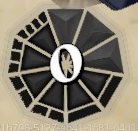
In the end, you just need to know the basics of all the different elements on the board are. Later as you develop as player things like the void, remaining cards, and other things start to become more important. That was not that bad, was it?
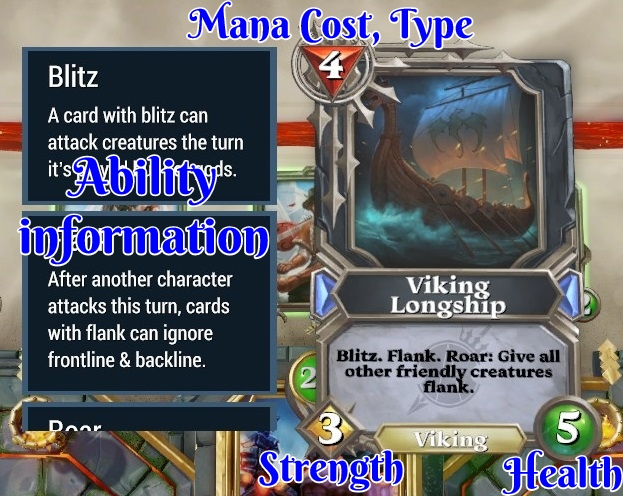
We can see in the upper left that it cost 4 mana to cast. The triangle color also indicates what god that card belongs in this case War. For this purpose and depth of guide that latter part is not the most important but still good to know. A grey triangle would indicate it’s a neutral and the rest are easy to work out by seeing what color the other gods are.
We can see in the bottom left of the card where the yellow diamond is the card’s strength which is 4. As you might know it better by the name damage. Cards that increase strength or are listed as +x number /0 will have an effect on the card's total damage.
The round green circle in the bottom right is the health. Cards that heal can do so up to the cards maximum unless it says it can go over. Other cards that add health such as 0/ +x number will increase that card's total health.
You also have the card's ability information which is further expanded out on the left-hand side of the screen. While you are playing in-game you can use the mouse wheel to further scroll that information bar if needed. Some creatures have a lot of things going on!
We can see the Viking Longship has blitz which means it can attack other creature cards as soon as it’s placed. It also has flank so after another card attacks, it can ignore guard cards (frontline) and attack anything it wants. It also has a onetime roar ability which grants flank to all your cards on the battlefield when it’s placed.
There are so many different abilities in this game. Cards with frontline have to be cleared before you can attack anything else including the player’s god. Cards with backline can’t be attacked until there are only backline cards remaining. Beyond that, there is a lot of abilities to learn. While mid-battle you can always hover your mouse over a card to see what it’s all about and that’s the best way to learn.
Beyond creature cards, you have many other types as well. Spells are used once that grant the ability they state. Relics are equitable items that the god then can use or are triggered when something happens that has a limited number of uses instead of health once placed.
You will have those moments where you are not quite sure what just happened to you. Sometimes checking the graveyard or what abilities a creature had that was placed is a great way to gain game knowledge. From there you can learn and hopefully reduce your losses the next time it happens.
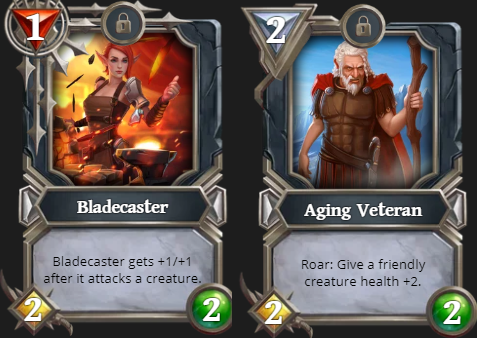
You can think of a combo like a chain of operations and you want to do as many as possible in a single action to prevent it from being broken or taken out. You also would not want to do things out of order if you can help it otherwise you might lose benefits certain cards can grant by doing it in the “right” order.
As a beginner, you really are just looking for simple ways to power up or gain an advantage over your opponent. Really easy ones to do are using cards that have +2 strength (damage) and/or +2 health on them. Naturally, placing down those cards with nothing else to put the bonus on would be a waste!
Combos can also be an easy way to create a runaway situation as seen in the above screenshot. Some cards start off weak but if they are left unchecked and are protected can become quite powerful mid to late game.
That Bladecaster gets a +1/+1 (attack/health) every time it attacks a creature but it is only a 2/2 and easy to kill. If it, however, became a 2/4 and was attacking a 1/1 the net result would be 3/3 and if you had, even more, + to health or even damage you could keep scaling that sucker up. The above combo is also only 3 mana so easy to get out in the first couple of moves. However, putting Bladecaster out alone could result in the opponent wanting to do an easy trade by attacking with their 2/2 or bigger and prevent all that from happening.
Just keep in mind the more powerful a creature(s) becomes the more willing your opponent to use high-level counters or everything they have to stop you before they lose the game. This can be great for you if you were expecting this and still have something in reserve to finish them off once they have expended themselves.
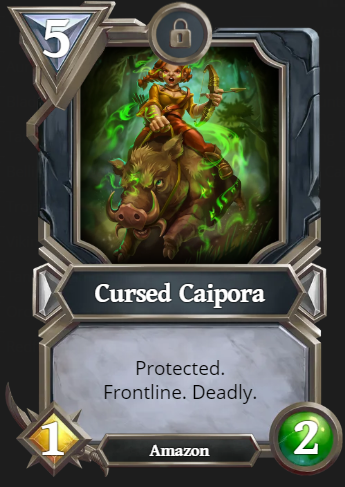
Combos can get far more advanced than this and turn into massive chains re-triggering each other with the afterlife effect and a bunch of other crazy stuff. For now, these two basic combos are a good starting place for thinking how the deck you enjoy playing can benefit from doing so.
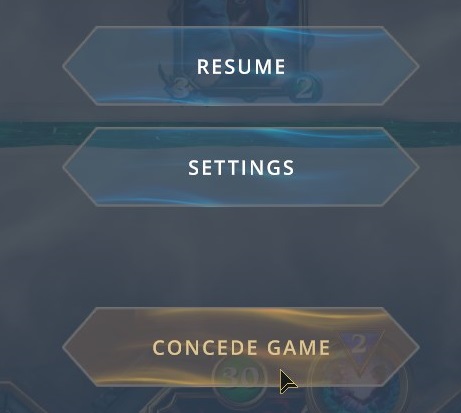
While we all like to think every single match up we will be winnable. Sometimes you face a player or deck that just out-matches you and you don’t have to answer to it. The board could be full of monsters and you lack a board clear. They could have a powerful 12/10 and you know there is not enough time to kill it.
Before you press that button however can you further learn anything from the matchup? As a beginner in Gods Unchained, so many of your early matchups you have are going to be learning opportunities. Have you seen and understand the deck that just wipes the floor of you? Are there unfamiliar cards or combos going on? Even if you are going to lose if you can learn further by sticking around do so.
Sometimes it can be easy to become frustrated and want to concede too early. You get matched up and right off see they have a high rank perhaps as a Priest or higher with lots of bought cards. They might have some fancy card backing and board pieces. Just because they spent the money does not mean they will be any good. You should wait till after turn four to see if you can just outplay the player with a deck you have had issues with in the past.
There are also other times you might want to consider hitting that button. You might have noticed some powerful decks sitting in the lower level matches. Some choose to toss matches just to ensure they have an easier time getting wins. While that might sound a bit dirty that is one tactic players use.
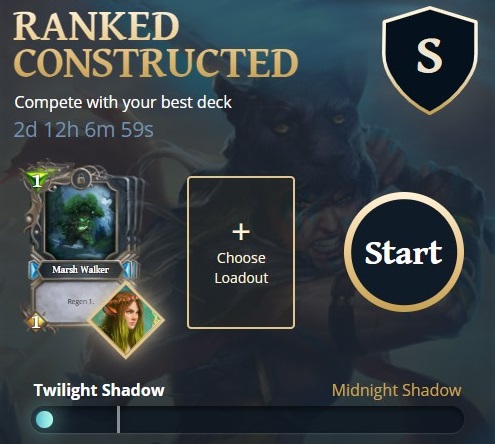
In the end, when there is nothing to be gained from a match using the concede button can help save you time and frustration. This is something a lot of new players struggle with so don’t be one of them.
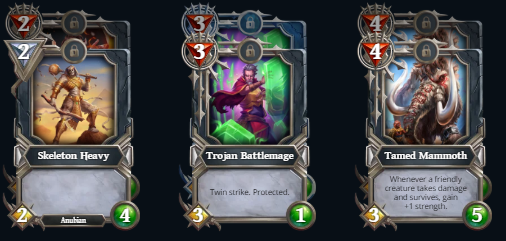
Hopefully, now you better grasp the game and start going out to get some matches in trying out different gods. Over time you should find a starter deck you feel confident in playing until you unlock a bunch of free core cards from leveling up. After that, you get into the fun part of making your own deck.
Now that you understand some of the fundamental basics of Gods Unchained it is time to take you to the next level.
Screenshots were taken and content was written by @Enjar about the game Gods Unchained. The game is in early access at the time of writing this.
Feel free to use my beta invite key (referral link). This helps support me and shows actual interest in this game which helps determine how much content I will be making for this game in the future.

